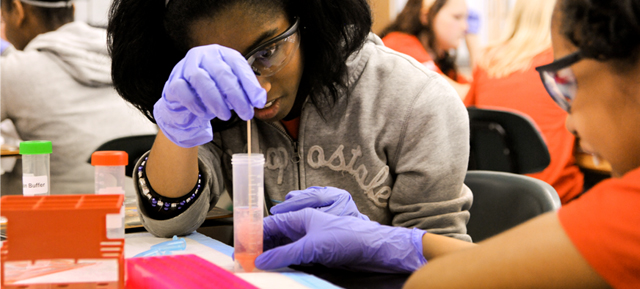Humane genomics education can reduce racism
By Brian M. Donovan, Monica Weindling, Jamie Amemiya, Brae Salazar, Dennis Lee, Awais Syed, Molly Stuhlsatz, and Jeffrey Snowden,
Science
| 02. 22. 2024
For as long as the concept of race has existed, racial prejudice has been justified on hereditary grounds (1, 2). Justifications of prejudice often misappropriate the work of Mendel, who first expounded a scientific model of inheritance by breeding peas (3). Today, our understanding of inheritance has moved far beyond Mendel, and insights from genomics refute the prejudiced idea that racial inequality is determined by genes (1). Even so, many believe that inequality is genetic because they are biased by an inaccurate conception of race called “genetic essentialism” (1, 2, 4). We present data from a randomized trial to argue that if teachers move genetics instruction beyond Mendel and toward more complex genomics concepts—what we call “humane genomics education”—they can protect students from believing in unscientific notions of genetic essentialism and support their scientifically accurate understanding of race as a social construction.
Genetic essentialism is a form of psychological essentialism, which is an early-developing bias in humans (4). Psychological essentialism is observable across human cultures and refers...
Related Articles
By Arthur Lazarus, MedPage Today | 01.23.2026
A growing body of contemporary research and reporting exposes how old ideas can find new life when repurposed within modern systems of medicine, technology, and public policy. Over the last decade, several trends have converged:
- The rise of polygenic scoring...
By Stephanie Pappas, LiveScience | 01.15.2026
Genetic variants believed to cause blindness in nearly everyone who carries them actually lead to vision loss less than 30% of the time, new research finds.
The study challenges the concept of Mendelian diseases, or diseases and disorders attributed to...
By David Cox, Wired | 01.05.2026
As he addressed an audience of virologists from China, Australia, and Singapore at October’s Pandemic Research Alliance Symposium, Wei Zhao introduced an eye-catching idea.
The gene-editing technology Crispr is best known for delivering groundbreaking new therapies for rare diseases, tweaking...
By Josie Ensor, The Times | 12.09.2025
A fertility start-up that promises to screen embryos to give would-be parents their “best baby” has come under fire for a “misuse of science”.
Nucleus Genomics describes its mission as “IVF for genetic optimisation”, offering advanced embryo testing that allows...




